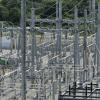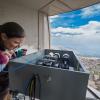News Headlines
 An international research team has solved a decade-old Martian phenomenon that once baffled planetary scientists. The new study shows that mysterious high-altitude “plumes” seen above Mars were ordinary twilight clouds viewed from a unique angle.
An international research team has solved a decade-old Martian phenomenon that once baffled planetary scientists. The new study shows that mysterious high-altitude “plumes” seen above Mars were ordinary twilight clouds viewed from a unique angle. Not all thank-yous land the same. Research shows the right kind of appreciation can boost morale and encourage open communication.
Not all thank-yous land the same. Research shows the right kind of appreciation can boost morale and encourage open communication. The equipment needed to keep the grid running is hard to make, materials are limited, and supply-chain bottlenecks are taking years to clear. Read from CU expert Kyri Baker and a colleague on The Conversation.
The equipment needed to keep the grid running is hard to make, materials are limited, and supply-chain bottlenecks are taking years to clear. Read from CU expert Kyri Baker and a colleague on The Conversation. Engineers at CU Boulder are developing new sensors that could one day help save farmers money, while reducing the environmental toll of agriculture.
Engineers at CU Boulder are developing new sensors that could one day help save farmers money, while reducing the environmental toll of agriculture.- Assistant Professor Mirela Alistar and postdoctoral researcher Joshua Johnson are working to develop nanorobots that more quickly and accurately build DNA to meet researchers' specifications in a matter of days instead of weeks.
 When Last Week Tonight wanted to talk about cuts to the Corporation for Public Broadcasting, its researchers called communication historian Josh Shepperd.
When Last Week Tonight wanted to talk about cuts to the Corporation for Public Broadcasting, its researchers called communication historian Josh Shepperd. Scientists across all fields make various types of claims about their innovations; validity tests check whether they deliver on what they promise. Read from CU expert Kai Larsen and colleagues on The Conversation.
Scientists across all fields make various types of claims about their innovations; validity tests check whether they deliver on what they promise. Read from CU expert Kai Larsen and colleagues on The Conversation. Pikas, which often greet hikers in the Rocky Mountains with loud squeaks, have long been a favorite of visitors to Colorado. A new study suggests that warming temperatures may already be taking a toll on these little animals.
Pikas, which often greet hikers in the Rocky Mountains with loud squeaks, have long been a favorite of visitors to Colorado. A new study suggests that warming temperatures may already be taking a toll on these little animals.- An ATLAS doctoral student is studying how brain activity syncs when musicians perform together.
 CU Boulder is one of 15 partner institutions on a research center that is spurring new quantum technologies, including sensors that can detect phenomena beyond the reach of traditional tools.
CU Boulder is one of 15 partner institutions on a research center that is spurring new quantum technologies, including sensors that can detect phenomena beyond the reach of traditional tools.


